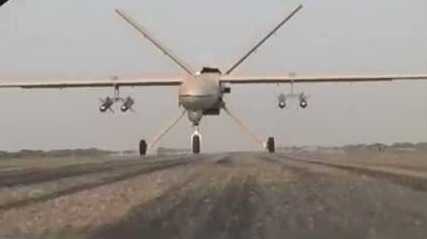
14 Feb 2023; MEMO: Iran has smuggled new and advanced combat drones to Russian forces through the use of boats and state-owned airlines, a report has revealed.
According to the Guardian newspaper, which cited inside sources familiar with the sale of the Iranian drones and their manufacture and capabilities, Tehran has been supplying Moscow with more advanced unmanned aerial vehicles (UAVs) in recent months by transporting them through less conventional means.
The majority of the UAVs are reported to have been secretly picked up from a base on the coast of the Caspian Sea by an Iranian vessel before being transferred at sea to a Russian naval boat, while others were transported on a state-owned Iranian airline.
One major shipment was carried out following a visit to Tehran by a ten-man Russian delegation – consisting of officers and technicians – in November, in which they were shown a wide variety of Iranian-manufactured drones and technologies.
That delegation reportedly selected six Mohajer-6 drones and 12 Shahed 191 and 129 drones, the former of which have a range of around 200 kilometres and carry two missiles under each wing, while the latter also possess air-to-ground strike capability. Those 18 drones were then delivered to the Russian navy that same month.
READ: Iran to supply China with 15,000 drones, official says
Along with the UAVs themselves, Tehran also reportedly sent technicians to Moscow to assist in integrating the drones into service, with 54 officials – three per drone – assigned to that task.
The Russians especially aimed to purchase and acquire the newer and more advanced Shahed drones after it expended many of its former Iranian-made UAVs in its ongoing invasion of Ukraine by using them as so-called kamikaze, or suicide, drones.
Since Ukrainian forces have become more experienced and effective in intercepting those attacks, which must fly low to strike their targets, Moscow apparently hopes to use the new drones to strike from a further distance while maintaining a high flight in order to return to their bases intact.
According to the paper, the drones Russia purchased were produced in the same military factory in the central city of Isfahan that a UAV strike targeted on 28 January, in what is believed to have been an Israeli attack.
Although American officials reportedly believe that Tel Aviv conducted it due to its national security concerns regarding Iran and its military capabilities rather than to provide assistance to Ukraine, it seems to have had the effect of stalling the manufacture and supply of more UAVs to Russia, as further deliveries were expected to be carried out after the last one on 20 November.




